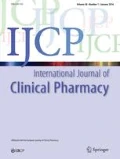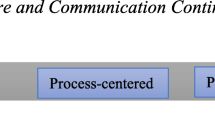Abstract
The model of shared decision making with mental health patients and clinicians (doctors and pharmacists) harnesses the benefits of patients becoming partners in their own recovery through improved communication and greater self-advocacy. Shared decision making in mental health services is an emerging model of care which has not been well investigated, however it is seen as the way forward to achieving improved health outcomes for non-pharmacological and pharmacological therapy. Successful implementation of this model requires supporting the process through provision of information and training, use of decision aids, coaching in communication skills and inclusion of family and carers in the decision making process. This summary examines the application of the shared decision making model for psychiatric medication management, including barriers and facilitators.
Similar content being viewed by others
References
Australian institute of health and welfare. Mental health-related prescriptions. Mental health services in Australia; 2019.
Australian Health Ministers Advisory Council. A national framework for recovery-orientated mental health services: guide for practitioners and providers. Canberra: Commonwealth of Australia; 2013.
Deegan PE. The lived experience of using psychiatric medication in the recovery process and a shared decision-making program to support it. Psychiatr Rehabil J. 2007;31(1):62–9.
Adams JR, Drake RE, Wolford GL. Shared decision-making preferences of people with severe mental illness. Psychiatr Serv. 2007;58(9):1219–21.
Morant N, Kaminskiy E, Ramon S. Shared decision making for psychiatric medication management: beyond the micro-social. Health Expect. 2015;19(5):1002–14.
Charles C, Gafni A, Whelan T. Shared decision-making in the medical encounter: what does it mean? (or it takes at least two to tango). Soc Sci Med. 1997;44(5):681–92.
Shepherd A, Shorthouse O, Gask L. Consultant psychiatrists’ experiences of and attitudes towards shared decision making in antipsychotic prescribing, a qualitative study. BMC Psychiatry. 2014;14:127.
Bradley E, Green D. Involved, inputting or informing: “Shared” decision making in adult mental health care. Health Expect. 2018;21(1):192–200.
Finnerty MT, Layman DM, Chen Q, Leckman-Westin E, Bermeo N, Ng-Mak DS, et al. Use of a web-based shared decision-making program: impact on ongoing treatment engagement and antipsychotic adherence. Psychiatr Serv. 2018;69(12):1215–21.
Haddad PM, Brain C, Scott J. Nonadherence with antipsychotic medication in schizophrenia: challenges and management strategies. Patient Related Outcome Measures. 2014;5:43–62.
McGrath P. ‘A very individual thing’: findings on drug therapy in psychiatry from the perspective of Australian consumers. Australian e-J Adv Mental Health. 2007;6(3):1.
Nosè M, Maria M, Eleonora E, Marco B, Paola P, Giovanni O, et al. Adverse effects of antipsychotic drugs: survey of doctors’ versus patients’ perspective. Soc Psychiatry Psychiatr Epidemiol. 2012;47(1):157–64.
Thompson L, McCabe R. The effect of clinician-patient alliance and communication on treatment adherence in mental health care: a systematic review. BMC Psychiatry. 2012;12(1):87.
Perez-Revuelta J, Villagran-Moreno JM, Moreno-Sanchez L, Pascual-Pano JM, Gonzalez-Saiz F. Patient perceived participation in decision making on their antipsychotic treatment: evidence of validity and reliability of the COMRADE scale in a sample of schizophrenia spectrum disorders. Patient Educ Couns. 2018;101(8):1477–82.
Alguera-Lara V, Dowsey MM, Ride J, Kinder S, Castle D. Shared decision making in mental health: the importance for current clinical practice. Australas Psychiatry. 2017;25(6):578–82.
Miller R, Pavlo AJ. Two experts, one goal: collaborative deprescribing in psychiatry. Curr Psychiatry Rev. 2018;14(1):12–8.
Dahlqvist Jonsson P, Schon UK, Rosenberg D, Sandlund M, Svedberg P. Service users’ experiences of participation in decision making in mental health services. J Psychiatr Ment Health Nurs. 2015;22(9):688–97.
Delman J, Clark JA, Eisen SV, Parker VA. Facilitators and barriers to the active participation of clients with serious mental illnesses in medication decision making: the perceptions of young adult clients. J Behav Health Serv Res. 2015;42(2):238–53.
Jorgensen K, Rendtorff JD. Patient participation in mental health care-perspectives of healthcare professionals: an integrative review. Scand J Caring Sci. 2018;32:490–501.
Patel SR, Bakken S, Ruland C. Recent advances in shared decision making for mental health. Curr Opin Psychiatry. 2008;21(6):606–12.
Légaré F, Thompson-Leduc P. Twelve myths about shared decision making. Patient Educ Couns. 2014;96(3):281–6.
Mistler LA, Drake RE. Shared decision making in antipsychotic management. Journal of Psychiatric Practice. 2008;14(6):333–44.
Fukui S, Salyers MP, Rapp C, Goscha R, Young L, Mabry A. Supporting shared decision making beyond consumer-prescriber interactions: initial development of the commonGround fidelity scale. Am J Psychiatr Rehabil. 2016;19(3):252–67.
Paudel S, Sharma N, Joshi A, Randall M. Development of a shared decision making model in a community mental health center. Community Ment Health J. 2018;54(1):1–6.
Stein BD, Kogan JN, Mihalyo MJ, Schuster J, Deegan PE, Sorbero MJ, et al. Use of a computerized medication shared decision making tool in community mental health settings: impact on psychotropic medication adherence. Community Ment Health J. 2013;49(2):185–92.
Ashoorian D, Davidson R, Rock D, Dragovic M, Clifford R. A clinical communication tool for the assessment of psychotropic medication side effects. Psychiatry Res. 2015;230(2):643–57.
Deegan PE, Carpenter-Song E, Drake RE, Naslund JA, Luciano A, Hutchison SL. Enhancing clients’ communication regarding goals for using psychiatric medications. Psychiatr Serv. 2017;68(8):771–5.
Hamann J, Kruse J, Schmitz FS, Kissling W, Pajonk FG. Patient participation in antipsychotic drug choice decisions. Psychiatry Res. 2008;178(1):63–7.
Crickard EL, O’Brien MS, Rapp CA, Holmes CL. Developing a framework to support shared decision making for youth mental health medication treatment. Community Ment Health J. 2010;46(5):474–81.
Tibaldi G, Salvador-carulla L, Carlos G-G. From treatment adherence to advanced shared decision making: new professional strategies and attitudes in mental health care. Curr Clin Pharmacol. 2011;6(2):91–9.
Slade M. Implementing shared decision making in routine mental health care. World J Psychiatry. 2017;16(2):146–53.
Acknowledgements
The authors acknowledge NGO group, Consumers of Mental Health WA, for their ongoing support in raising awareness of SDM and encouraging the development of this document.
Funding
This work was carried out independently with no external funding.
Author information
Authors and Affiliations
Corresponding author
Ethics declarations
Conflict of interest
The authors declare that they have no conflict of interest.
Additional information
Publisher's Note
Springer Nature remains neutral with regard to jurisdictional claims in published maps and institutional affiliations.
Appendix
Appendix
Key points to consider with implementing SDM model for mental health patients.
Benefits include:
-
Improved symptoms and decreased hospitalisation rates
-
Improved treatment adherence
-
Improved satisfaction with medical care
-
Improved self-esteem
Barriers include:
-
Lack of confidence and assertiveness
-
Limited access to information
-
Patient lack of trust and awareness of rights
-
Poor communication by all or either party
-
Misperceptions about patient’s decisional ability
-
Lack of positive experiences with medications and illness symptoms
Facilitators include:
-
Use of Decision Aids
-
Specific clinician training
-
Specific patient/carer training
-
Involvement of family and carers
-
Development of an implementation strategy
Rights and permissions
About this article
Cite this article
Ashoorian, D.M., Davidson, R.M. Shared decision making for psychiatric medication management: a summary of its uptake, barriers and facilitators. Int J Clin Pharm 43, 759–763 (2021). https://doi.org/10.1007/s11096-021-01240-3
Received:
Accepted:
Published:
Issue Date:
DOI: https://doi.org/10.1007/s11096-021-01240-3




